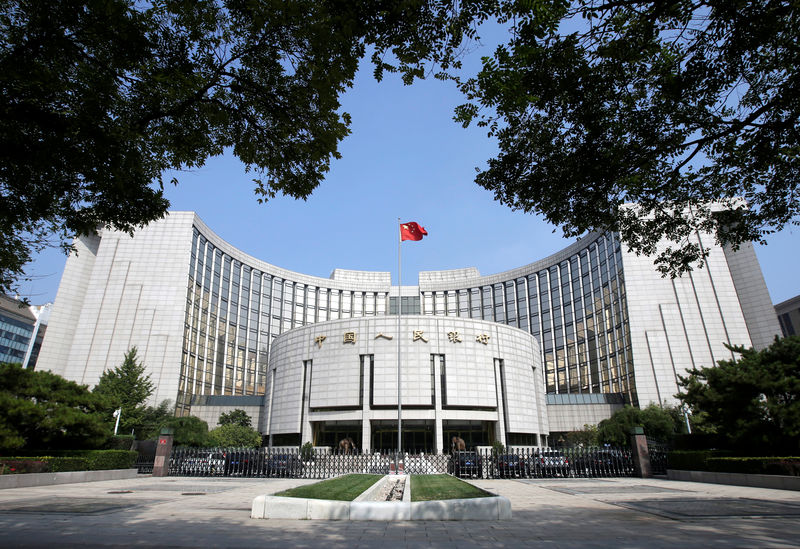By Yawen Chen and Kevin Yao
BEIJING (Reuters) - China's central bank said on Monday it will cut reserve requirement ratios (RRRs) to release about 280 billion yuan ($41 billion) for some small and medium-sized banks, in a targeted move to help companies struggling amid an economic slowdown.
The cut in the amount of cash that banks must hold as reserves would be the smallest since January 2018, when the People's Bank of China (PBOC) started its latest round of policy easing to support the world's second-largest economy.
The cut, while widely expected at some point, was announced right before China's stock market opened, and just hours after U.S. President Donald Trump sharply escalated trade tensions between the world's two largest economies.
The PBOC said in a statement that the reduction will come into effect on May 15. The funds will be used for loans to small and private companies.
The central bank said it will cut the RRR for about 1,000 rural commercial banks operating in counties to 8 percent, equal to the RRR for smaller rural credit cooperatives.
The move will help lower funding costs for small and micro firms, the PBOC said.
Small and medium-sized banks currently have RRRs ranging from 10 percent to 11.5 percent.
The PBOC has already delivered five RRR cuts since early 2018, lowering the ratio to 13.5 percent for big banks and 11.5 percent for small-to medium-sized lenders.
The central bank pumped out 3.35 trillion yuan in net liquidity through the five reserve cuts, according to Reuters calculations based on PBOC data and analyst estimates.
Analysts believe PBOC has less room to ease policy after it cut RRRs and interest rates aggressively during the global financial crisis, and delivered more cuts in 2012 and 2015 - a year marked by a stock market crash and a slide in the yuan.
The government, which is relying more on increased infrastructure spending and tax cuts to support economic growth this year, has repeated said it will not resort to "flood-like" stimulus.
INTRIGUING TIMING
Previous policy announcements usually fell on non-trading times after the market closed, analysts from Citic Securities noted, making the timing of this announcement intriguing.
Just hours earlier, Trump issued a series tweets in which he complained that trade talks with China were proceeding "too slowly", and that he would raise tariffs on $200 billion of goods to 25 percent on Friday from 10 percent.
His comments upended markets that had been enjoying a period of calm thanks to signs of robust growth in China and the United States, and from previous comments from Trump and other senior U.S. officials that trade talks were going well.
Some analysts believed the PBOC was seeking to reassure investors unnerved by Trump's latest comments.
"I think it is a move to calm the market, to offset the impact from the trade talks, telling you that 'I can give some stimulus during the most difficult times, but I will not give too much'," said Zhou Hao, analyst at Commerzbank (DE:CBKG) in Singapore, adding that the PBOC's targeted cut showed Beijing's resolve to keep its debt level in check.
Despite the policy boost, China's major stock indexes still extended heavy losses.
The blue-chip CSI300 index and the Shanghai Composite Index both tumbled more than 5 percent, posting their steepest single-day drop since February 2016. Hong Kong's Hang Seng index slumped more than 3 percent.
China's currency, the yuan, dropped to as low as 6.7994 per dollar, its weakest level in 3-1/2 months, while the offshore yuan fell as much as 1.3 percent.
"Beijing has been sounding less dovish over the past two weeks. We believe a worsening of the trade conflict between the US and China will evoke another dovish turn by Beijing, especially on its monetary easing stance," Ting Lu, chief China economist at Nomura in Hong Kong, wrote in a note.
Economists had expected further targeted cuts on the RRR this year as Beijing seeks to underpin growth. The State Council, or cabinet, said on April 17 that a policy framework would be set up to implement relatively low RRRs for small- and medium-sized banks.
The PBOC is likely to cut RRRs for small banks to encourage more lending to small and private firms - which are vital for economic growth and job creation - policy insiders told Reuters previously, who penciled in at least one such "targeted" RRR cut this year.
China's Vice Premier Liu He, who was scheduled to meet U.S. officials in Washington for further trade talks this week, is "very unlikely" to go after Trump's tariff "threat", editor-in-chief of China's Global Times newspaper said on Monday.
China's foreign ministry said on Monday a Chinese delegation is preparing to go to the United States for trade talks, although it did not say if Vice Premier Liu would be part of the delegation.
